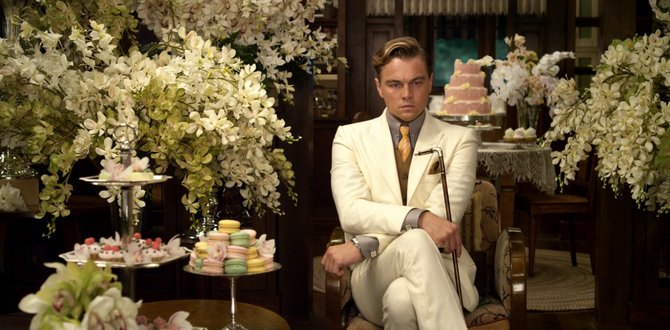Baz Luhrmann's spectacle overwhelms the story in his adaptation of "The Great Gatsby," starring Leonardo DiCaprio. Photo by Courtesy Warner Bros
Gatsby: Not So Great
by Anita Modak-Truran
Baz Luhrmann's spectacle overwhelms the story in his adaptation of "The Great Gatsby," starring Leonardo DiCaprio.
Courtesy Warner Bros
Baz Luhrmann's "The Great Gatsby" is a visual translation of the concept of hysteria. The film is loud, obnoxious and doesn't communicate the graceful and elegantly controlled spirit of F. Scott Fitzgerald's novel. Luhrmann unleashes a spectacular montage of moving images of the grand old roaring '20s that evaporate within seconds upon viewing. Quite strikingly, the performances of great actors are overshadowed by the zealous craze of a director who ignores the romance of the story and peps up the action with drunken revelry and car chases.
Nick Carraway (Tobey Maguire) narrates this sacrilegious experience from a sanitarium, where a crusty psychiatrist pushes him to tell his story. How did Nick get so messed up? The camera lingers on the doctor's notes so you can read Nick's list of ailments: morbid alcoholism, insomnia, anger.
Gazing out the window upon the white flakes of snow drifting to the ground, Nick reflects with heavy sadness of the past. He laments: "Gatsby was the single most hopeful person I ever met."
Luhrmann takes his time building up Jay Gatsby's persona before he reveals Gatsby's visage. It's a carefully planned introduction. As George Gershwin's "Rhapsody in Blue" reaches its crescendo, Gatsby (Leonard DiCaprio) turns and strikes a dashing pose. His beautiful face breaks into a dazzling smile, and then comes the cringing lines, repeated forevermore, of "Old Sport" this and "Old Sport" that. Luhrmann uses Gatsby like a marionette puppet to be manipulated by the director's hubris.
It's never clear why Gatsby is so hopeful. Luhrmann sprinkles in some clues for those who have read the book. We see the winking green beacon at the end of Daisy Buchanan's dock. Gatsby bumbles around Daisy (Carey Mulligan) during the fateful tea ceremony at Nick's bungalow. We watch Gatsby stare into the mist, mesmerized by the light, a symbol of the lost love of his youth. In multiple scenes, Gatsby reaches out as if to snatch the green beacon in his hand. This is true to the book, but the movie's literal showing of it looks contrived and corny.
Luhrmann loves the spectacle, and here he takes descriptions from Fitzgerald's novel and goes to town trying to improve on them. Daisy and her husband, the ruthless billionaire Tom Buchanan (Joel Edgerton), live in clouds of white flowing chiffon curtains in a mansion with a pier. There's so much hot air in the rooms that you can't help but hope that the billowing draperies strangle its inhabitants.
Tom's mistress Myrtle (Isla Fisher) and her husband, the shabby filling station owner George (Jason Clarke), live in a third-world refuge on the outskirts of New York City. The have-nots struggle to survive, compared to the rich, who use the poor for their own entertainment. Gatsby lies somewhere in between; he's caught in the past.
The major problem in the movie is that for all of its glittery and glamorous imagery, we don't feel anything. We are distanced by the movie's overproduction. We can't move beyond Gatsby's mechanical recitation of "Old Sport." And we can't understand what's so grand about Daisy Buchanan. Carey Mulligan brings more range to the role than Mia Farrow did in the 1974 film, but we never understand why Gatsby thought this vapid fool was good enough for him.
In isolation, the performances from the cast are excellent. I prefer DiCaprio's Gatsby to Robert Redford's. DiCaprio improves with age; here, he's a mix of J. Edgar Hoover, Howard Hughes and Jack Dawson. But Luhrmann has clipped his wings from exploring the full depths of the Gatsby character with one too many "Old Sports" and grabs for the green light.
The music by talented Jay-Z doesn't aid in unifying the film. I applaud the risky decision to use rap-styled urban music with a romantic story based on the early '20s. But like all bold choices, the risk of greatness or failure is equally large. Here, the music's great, but it's an epic failure in capturing a cohesive feel for the film. The parts simply don't congeal.
What's missing in Luhrmann's "Great Gatsby" is hope. The movie swings in a bipolar fashion from dark melancholy to crazy buzzing insanity. But hope is no where in sight. It's probably left on a boat "against the current, borne back ceaselessly into the past." You may prefer to stay home and read the book, while listening to the soundtrack.


